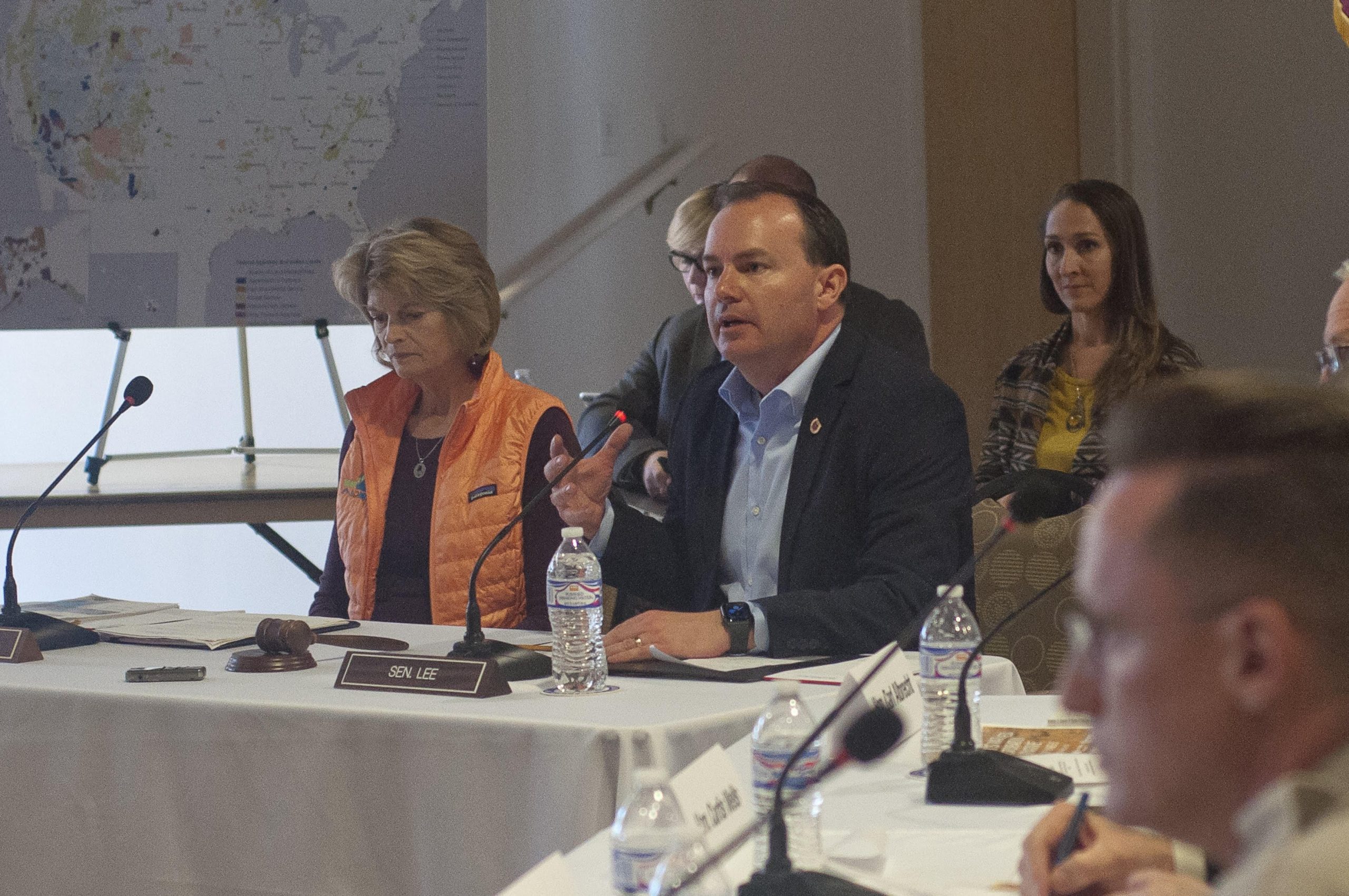Some information may be outdated.
On Oct. 25, senators Lisa Murkowski (R-AK) and Mike Lee (R-UT) met with representatives John Curtis, Rob Bishop (R-UT), Paul Gosar (R-AZ), and Jim Baird (R-IN) at the Grand Center in Moab for a U.S. Senate Committee on Energy and Natural Resources Subcommittee on Public Lands, Forests, and Mining roundtable discussion. The purpose of the meeting, according to the notice on the committee webpage, was to “examine successes in state management of state and federal public lands in Utah.”
In addition to the federal representatives, the meeting notice also lists Grand County Councilmember Curtis Wells, State Representative Carl Albrecht, School and Institutional Trust Lands Administration Director David Ure, Utah Public Lands Policy Coordination Office Director Kathleen Clarke, and the Utah Division of Forest, Fire, and State Lands forester Brian Cottam as attending in their official capacities.
Lee made a case for state land management, pointing to the success of state government and political subdivisions in generating revenue to support Utah public schools and other trust institution. He pointed to the School and Institutional Trust Lands Administration (SITLA)–which manages trust lands to generate revenue for Utah public schools and other trust institutions through the leasing, exchange, or sale of those lands–as an example. Lee said that, while trust lands are not public lands, SITLA has preserved public access and use of trust lands for hunting, trapping, and fishing, as well as other forms of public recreation, while generating more than $1.5 billion in revenue for the Permanent School Fund since 1994.
“In other words, while the federal government routinely loses hundreds of millions of dollars every year managing our public lands, state trust agencies manage to turn a profit all while preserving the land for future generations,” Lee said in a statement on his Facebook page posted along with a link to video of the event.
During the meeting, he also said that states are better environmental stewards.
“States like Utah have a proven track record of successful partnerships with the Forest Service and Bureau of Land Management,” Lee said. “These partnerships have resulted in the restoration of millions of acres of high priority watersheds, wildlife habitat and rangelands. We need to continue to expand and encourage these kinds of efforts to allow states to step up and lead.”
Curtis said there are a “disproportionate” amount of public lands in the Western states and that the dialogue in Washington, D.C. often excludes the downfalls, such as a lack of property tax generated by those lands (often the main source of revenue for local governments) and a limited ability for economic development to take place. He called the situation “divisive,” and said the federal government is failing to adequately fund management of those lands, citing “two BLM agents in San Juan County, managing that entire area” as an example of where federal management has fallen short.
Curtis said that the federal government’s Payment in Lieu of Taxes (PILT) is sporadic and does not adequately compensate areas where public lands limit property tax collection.
Wells agreed with Curtis, calling PILT “entirely inadequate to compensate these counties in these rural areas for the services and the work that we do to provide infrastructure and quality of life for our citizens.”
“If the federal government is going to own that much land in Grand County, there’s got to be adequate compensation for it,” Wells said. “And the answer to that is not to beef up the federal agencies; the answer is local control.”
Wells pointed to Sand Flats Recreation Area as an example of local control done right.
“The land is owned by the BLM, managed by the county,” Wells said. “(They have a) balanced budget. They successfully manage overlapping interests with all kinds of recreation user groups. They do it really well. They know these people; they have the relationships; and they know the land the best.”
Wells said that SITLA “is not the model for state land management.”
“Privatization and economic development is not the face of state land management,” Wells said. “It’s state agencies. And I can tell you that as a local representative, I’d much rather worry about the politics of Salt Lake City than the politics of Washington, D.C. The relationships that we have with the state are really vital…Those relationships are what really matters in public lands management.”
Lee later said that the conversation was not “whether or not to have public land.”
“That’s not what we’re discussing at all,” he said. “We’re talking about who owns it, who manages it, and what the circumstances are for its management.”
“Public lands fall into a number of categories…school trust lands serve one set of purposes, state trust lands…have a different destiny than other types of public lands. Many of them are in fact set aside and developed.”
Lee added that some lands, such as national parks and national recreation areas, will never be developed.
Video of the event is available on Senator Mike Lee’s Facebook page, https://www.facebook.com/senatormikelee/
Federal subcommittee roundtable held in Moab
Appreciate the coverage? Help keep local news alive.
Chip in to support the Moab Sun News.





